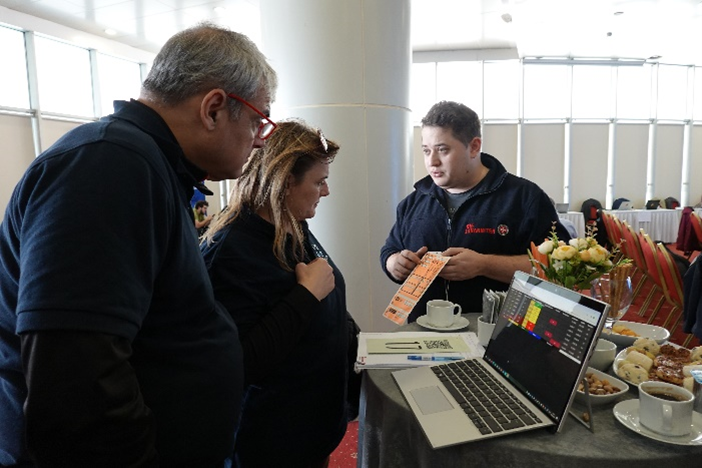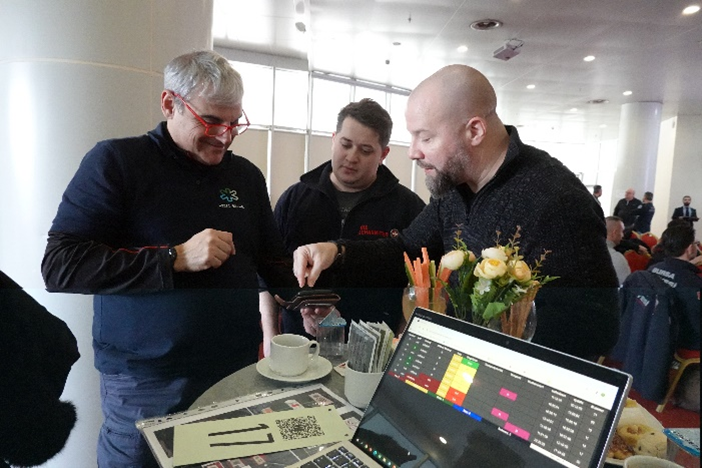Triage Systems and the need for digitalisation: testing the electronic Patient Leading System (ePLS) at TeamAware’s final demonstration in Bursa, Türkiye (February 5 – 9, 2024)
Blogpost by JOAFG (authors: Veronika Simanko, Ben Schuster, Ilona Grabmaier)
Within the TeamAware project, the Johanniter Research and Innovation Center (JOAFG) is mainly involved in WP13 “Demonstration and Validation” and responsible for the lead of WP14 “Dissemination, Exploitation and Communication.”
During the final demonstration of the TeamAware project in Bursa, Türkiye, which took place from February 5th until February 9th, 2024, JOAFG’s task was not only to document the events taking place during the final demonstration by means of photos and video, to write a final report and to produce project videos (see: https://www.youtube.com/watch?v=9bTUuW_cF4M and https://www.youtube.com/watch?v=voghsQI99aw); we also seized the chance to present, explain and test an electronic Patient Leading System (ePLS) which was developed by JOAFG within the project’s scope.
The Electronic Patient Leading System (ePLS)
Mass casualty incidents and disaster situations are managed by first responder organisations through the deployment of triage systems to prioritise patient treatment and transportation from the incident site. Triage systems are well established worldwide across first responder organisations and triage algorithm details are very similar in their deployment. The need for a robust solution that is easy to use and fail-safe has so far hindered the digitalisation of existing solutions, even though the benefits for all parties involved would be obvious.
The development of an electronic Patient Leading System within the TeamAware project is the result of an often-voiced request from different first responder organisations. The need to optimise communication across multiple checkpoints where patient count and location needs to be communicated and registered thus led to the development of a digital dashboard and scanner interfaces. These are visible to all participants in real time and editable by all involved responders, providing all parties with immediate updates.
Testing the ePLS at TeamAware’s final demonstration
The final demonstration provided a great opportunity to present the developed ePLS system to medical first responders from different countries. As a first step, the current PLS system was explained to them and they were shown a PLS-card as it is currently used at Johanniter Unfallhilfe. Afterwards, the newly developed ePLS was presented, including the QR-Code and webpage for the control centre. During this process, comments from the participants were noted and afterwards, they were asked to answer questions in relation to the ePLS, mainly concerning the usability of the system and suggestions for improvement.




As a result of the testing, several additional functions, such as a button for indicating the consciousness/responsiveness of the patients, a feature for documenting the performed treatments or the possibility to indicate whether the patient was an adult/child/male/female/pregnant, were recommended by the test persons. Nevertheless, respondents noted that in principle, all the most important functions are there and they thought that using a smartphone for triage is very practical and a good idea. They classified the tool as “definitely useful for the organisation” and thought that it would be “cool to have it”. Especially the direct transmission to the operation centre was perceived as very useful. Also, the function with which wounded body parts can be marked was consistently positively received, as was the fact that little light is needed and that the system gives a good overview. Furthermore, the participants noted that the ePLS does not seem like an expensive solution, which is considered to be a great benefit.
All in all, the ePLS was well received and participants noted many benefits while seeing little problems. Requests for additional functions were made and a big interest in using the system was expressed.
